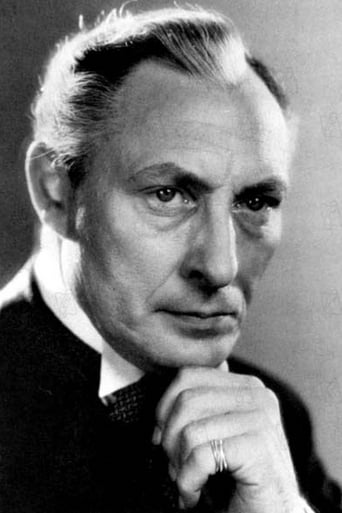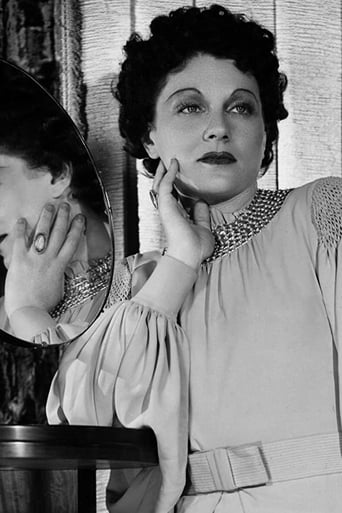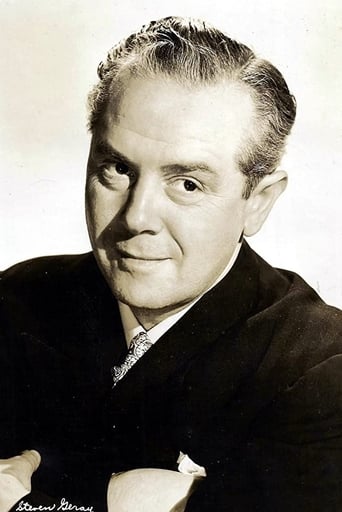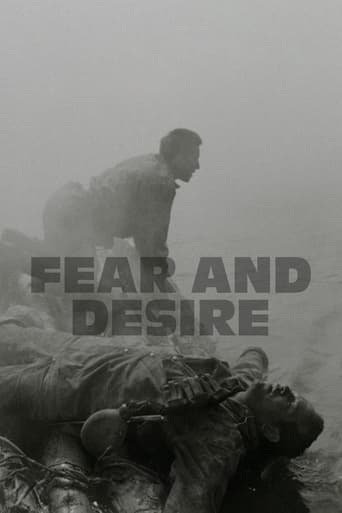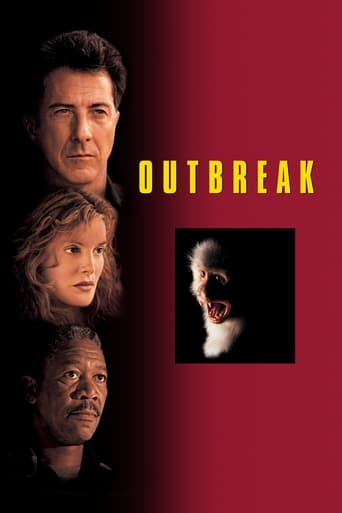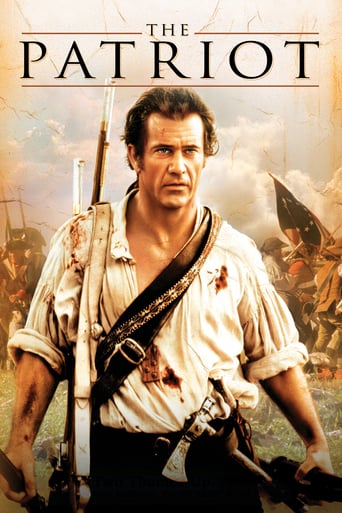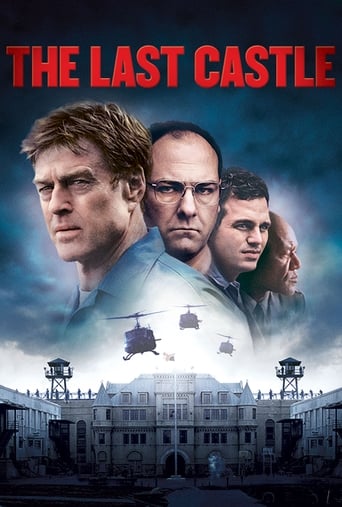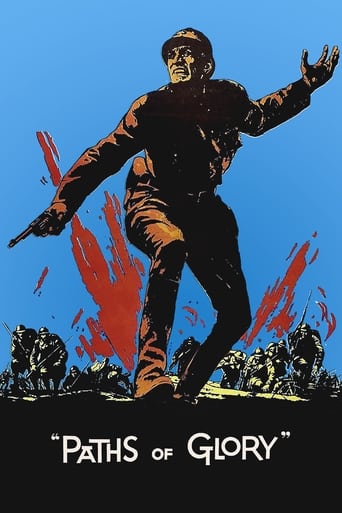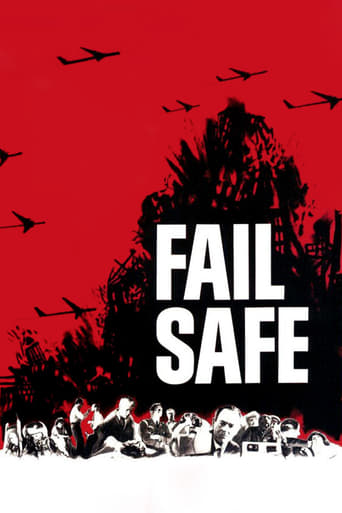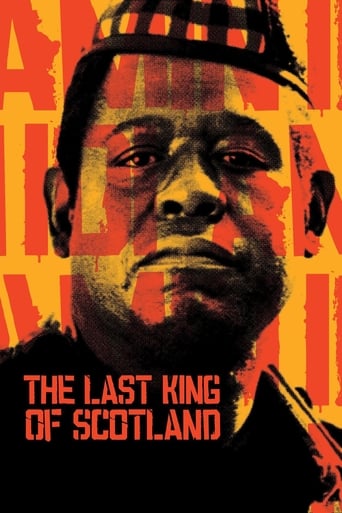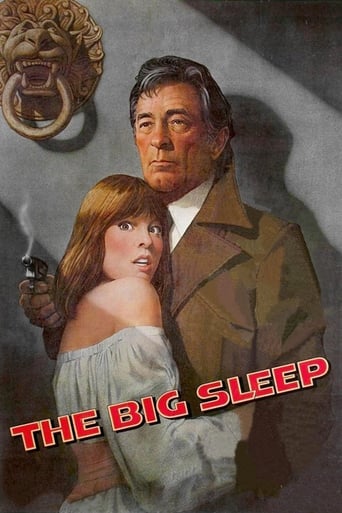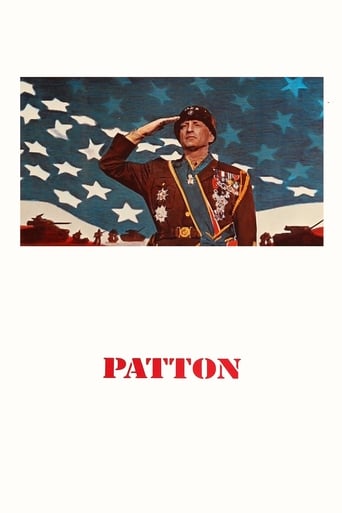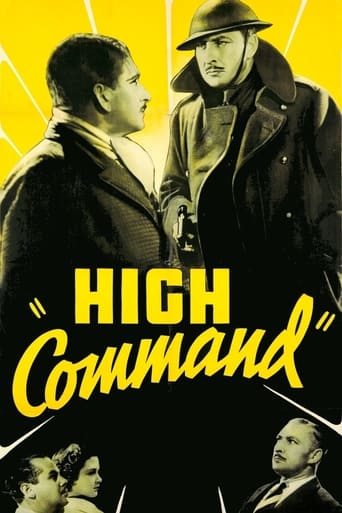
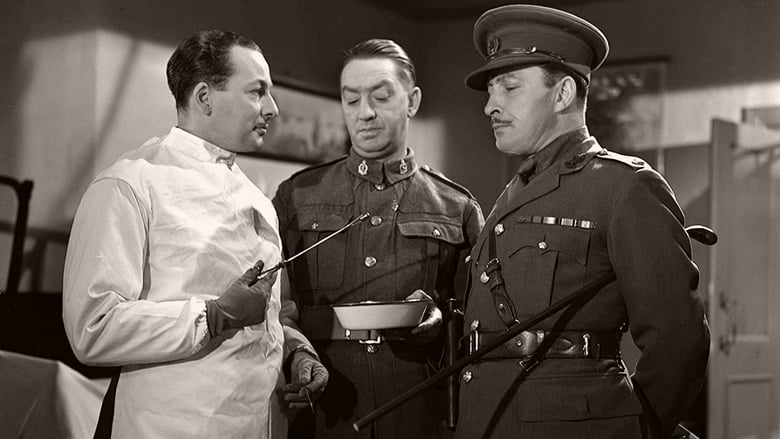
The High Command (1938)
A general must come to terms with a crime he commited years earlier.
Watch Trailer
Cast


Similar titles
Reviews
Lionel Atwill (Major-General Sir John Sangye), Lucie Mannheim (Diana Cloam), Steve Geray (Martin Cloam), James Mason (Heverell), Leslie Perrins (Carson), Allan Jeayes (governor), Michael Lambart (Lorne), Henry Hewitt (defence counsel), Wally Patch (Crawford), Kathleen Gibson (Belinda), Tom Gill (Daunt), Philip Strange (Major Challoner), and Frank Atkinson, Evan Thomas, Cyril Knowles.Director: THOROLD DICKINSON. Screenplay: Katherine Strueby. Dialogue: Walter Meade, Val Valentine. Based on the 1936 novel The General Goes Too Far by Lewis Robinson. Photography: Otto Heller. 2nd unit photography: Jack E. Rogers. Film editor: Sidney Cole. Music: Ernest Irving. Art director: R. Holmes Paul. Costumes designed by Arnulf Viberacker. Production manager: Cecil Dixon. Assistant to the producer: J. Sligo. Sound supervisor: Stephen Dalby. Sound recording: Paul F. Wiser. RCA Sound System. Producer: Gordon Wellesley. A Fanfare Production, made at A.T.P. studios, Ealing.Copyright 15 July 1938 by Grand National Films, Inc. No recorded New York opening. U.S. release: 15 July 1938. Released through Associated British Film Distributors in the U.K. in May 1937. 90 minutes. Re-issued in the U.K. by Renown Pictures in 1945 in a version cut to 74 minutes. U.S. length: 59 minutes.SYNOPSIS: Following an ambush in Ireland in 1921, Major Sir John Sangye, V.C., and a civilian, Challoner, find themselves the sole survivors. Challoner accuses Sangye of being the father of his wife's child and draws a revolver. Sangye, however, is too quick and kills him, but Carson, the medical officer, discovers Sangye's secret.Sixteen years later, Sangye, now a General, is in command of a West African Garrison to which Carson is attached. Sangye's step- daughter, Belinda is with him and Carson knows that she is really the General's own daughter. Carson makes a play for her. Heverell, Carson's cousin and brother officer, is having an affair with Diana, wife of Martin Cloam, a trader, but Cloam erroneously believes that Carson is Diana's lover.COMMENT: Court-martial drama very capably and stylishly directed by Thorold Dickinson — though we might except his failure to integrate the location material shot by photographer Jack E. Rogers with the studio material photographed by Otto Heller. Acting is solid — and the cast is certainly a very interesting one. The dialogue by Walter Meade and Val Valentine is at its best in the court-room exchanges (we love Atwill's line: "I shall decline to follow you into the realm of vague speculation." — "And the court must decline too, Mr Stebbins.") and holds interest throughout at an engrossing level.
This new DVD was in a bargain bin for 50 cents, and is likely only available (in a poor transfer with bad sound) because it provides an vehicle for a very young James Mason. It has the feel of a movie that would have been given to promising young director, along with a trifling budget and an unrealistic shooting schedule. Props seem to have been borrowed from earlier films, much of it is shot on the back lot, and most was probably the first take. The script was a bit too bookish and wasn't revised as needed; consequently the plot turns heavily on some rather minor points that are not given the necessary emphasis, result being that it takes close attention to figure out that the plot actually does make sense and the story is, in principle, quite promising, although weak direction and acting beat it down, with the editor delivering the coup de grace. Yet in these many flaws lies the film's strength: you can see all of the ways in which this is an amateurish production, and in so doing, you can see what they should have done to get it right. In other words, this film tells you a lot about how to make pictures right by showing you how to make them wrong. It shows you a journeyman's picture out of the heyday of the studio era, and in that sense is historically interesting; and finally, if you see the struggles of cast and crew objectively, you can sympathize with them; they started off with a decent script and good intentions, but were defeated by inexperience, limited resources and too little time. Thus this film works, accidentally, as a movie about making movies.
The High Command is a static and turgid mess that hints at great promise but never delivers the goods. Lionel Atwill stars as a British army officer who has a dirty secret: before being stationed in West Africa, he murdered a man in Ireland and blamed the death on the Irish Republican Army. Atwill is fine, but the rest of the cast is lacking--particularly a restrained James Mason, who looks uncomfortable underneath an assortment of false moustaches. Director Thorold Dickinson gives it the old college try, and his set-ups reflect the influence of Soviet social realism, the British documentary movement of the period, and even a hint of Hitchcock. Sadly, The High Command's talky story is completely uninvolving and Dickinson's visual flair is held in check as the film trudges to a mind-numbingly dull courtroom conclusion.
Based upon a novel by Lewis Robinson, who assists with the script, HIGH COMMAND gives us a complex tale of blackmail, murder, and other delights, ranging over two continents and two generations, beginning in 1921 Ireland and concluding in West Africa (most of the film was shot in Nigeria and Gold Coast). General Sir John Sangye (Lionel Atwill), holder of the Victoria Cross and commander of a colonial garrison, in order to help protect his daughter Belinda (Kathleen Gibson) from unsavoury scandal, is forced into making several wrenching decisions, with Atwill giving the finest crafted performance of his career. In his first effort at directing a feature film, Thorold Dickinson displays the fluid work with a camera which marks his distinguished career, and has expertly taken a balance of drama and humour from the script while effectively leading his talented cast into strong performances, notably from Steven Geray, Leslie Perrins, James Mason and Lucie Mannheim. Dickinson, along with cinematographer Otto Heller, benefit from their background in silent cinema, and Ernest Irving's score is adroitly woven into the action, all of which assists in effectuating a masterwork.


